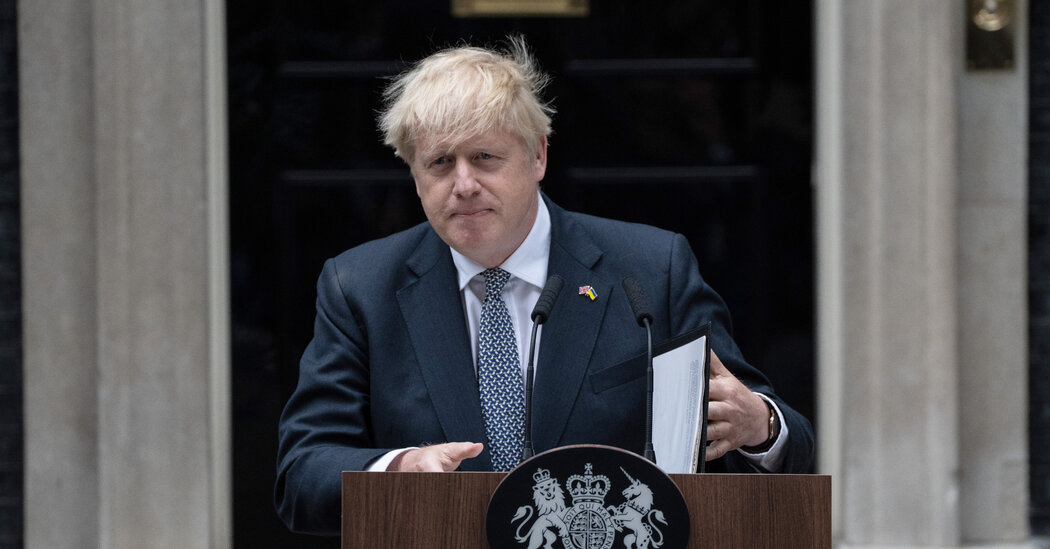
Boris Johnson has been pushed into giving up leadership of the country during a perilous economic moment, leaving behind a grim outlook and an uncertain Brexit legacy.
On Thursday afternoon, Mr. Johnson described his resistance to stepping down “when the economic scene is so difficult.”
It has become a period that is frequently compared to the 1970s in Britain, an era of stagflation when the economy shrank and inflation soared and vital services were halted by widespread strikes. Britain isn’t repeating this stagflationary era yet, but the threat is there.
Inflation in the country has reached an annual rate of 9.1 percent, the highest in four decades, driven by supply chain disruptions from pandemic lockdowns and the war in Ukraine. And price pressures keep building as companies begin to pass on the increase in costs to their customers and workers demand higher wages to cope with the rising cost of living.
Households are facing the worst squeeze on their living standards in generations because wage growth is not keeping up with inflation, which isn’t expected to peak until at least the fall when the price cap on household energy bills is reset higher. Disposable household income, once adjusted for inflation, is expected to fall by more than 2 percent this year.
That’s the worst since 1945, according to Oxford Economics.
“It is a really tough time for a lot of people,” said Andrew Goodwin, the chief U.K. economist at Oxford Economics. For lower-income households, “it’s going to be worse because the sorts of things that you spend more on — food, petrol, energy — are the things that are going up in price the most rapidly. So their inflation rates are going to be even higher.”
As pay falls far behind inflation, workers have called strikes that set Britain up for a summer of labor unrest. Recently, train workers and criminal defense lawyers walked off the job, and health care workers, schoolteachers and postal employees are among those threatening to strike in the coming months.
The unrest and anger reflect the pain many households feel. Mr. Johnson and his former chancellor, Rishi Sunak, who resigned on Tuesday, tried to ease some of this burden in May when they announced another round of cost-of-living payments and bill reductions. But hardship was already widespread for lower-income households, who couldn’t build up savings during the pandemic. Food bank usage had risen during the pandemic, even before the latest surge in inflation.
Mr. Johnson’s departure leaves considerable uncertainty about the government’s next moves to address economic hardship. It could cause a delay in the introduction of the next budget, where spending and tax decisions are determined. For investors and economic analysts, the crucial question is what is the future of fiscal policy and if a new chancellor, Britain top finance minister, will reverse the last chancellor’s increase in taxes for many workers.
Even though many of the economic shocks hitting Britain now, such as the jump in energy prices, are shared with other countries, Britain’s outlook is particularly challenging.
“These shocks are revealing deep-seated problems that have been around for a while and making the economy much more precarious than it would otherwise be,” said Jagjit S. Chadha, director of the National Institute of Economic and Social Research.
The research institute expects little economic growth in Britain this year and next year, compounding a long-running problem of unequal wealth and income distribution. At the same time, Mr. Chadha said, Brexit has been a “slow puncture” to the British economy, dragging down growth as trade barriers have been erected, European Union citizens have left the labor market and policy uncertainty has discouraged business investment.
“This is not a very attractive picture that I’m painting,” said Mr. Chadha. “But this is the inheritance of whoever is the next prime minister and the cabinet that comes along.”
Andrew Bailey, the governor of the Bank of England said last month that the British economy was “probably weakening rather earlier and somewhat more than others.”
To combat inflation, the central bank has been raising interest rates since December, bringing them to their highest level since 2009. Further increases have become more uncertain as policymakers try to strike a balance between curbing inflation and risking a recession. Oxford Economics is predicting that the British economy will be stagnant for the next year.
Mr. Johnson’s economic agenda was a pitch to “level up” the country in a grand plan to reduce regional inequality. But to many analysts, the plan has fallen flat for its lack of specificity. His oft-stated drive to build a “high-wage, high-skill, high-productivity economy” was delivered in words but not policy action, they said.
“Certainly there are some good slogans, but not a huge amount of achievement behind it,” said Mr. Goodwin. “A lot of these sort of policies, they were ideas, nothing then followed on. There was no delivery mechanism.”
One of Mr. Johnson’s proudest achievements was “getting Brexit done.” But as that process continues to be mired in conflict in Ireland, Mr. Johnson’s Brexit legacy is uncertain, as the economic benefits of leaving the European Union are slow to materialize.
For many industries, including farm work, construction and hospitality, the legacy of Brexit is a smaller work force that is causing businesses to slow down. For small businesses exporting to the European Union, Brexit has brought extra costs and red tape, with no discernible benefits. Trade barriers have also worsened food inflation, according to economists.
“We have a world in which technically we’ve left the European Union, but we haven’t replaced it with the kind of trade agreements that might have fostered better growth than would otherwise be the case,” said Mr. Chadha. “We haven’t really ‘Brexited’ in the way that people said we would’ve done.”



